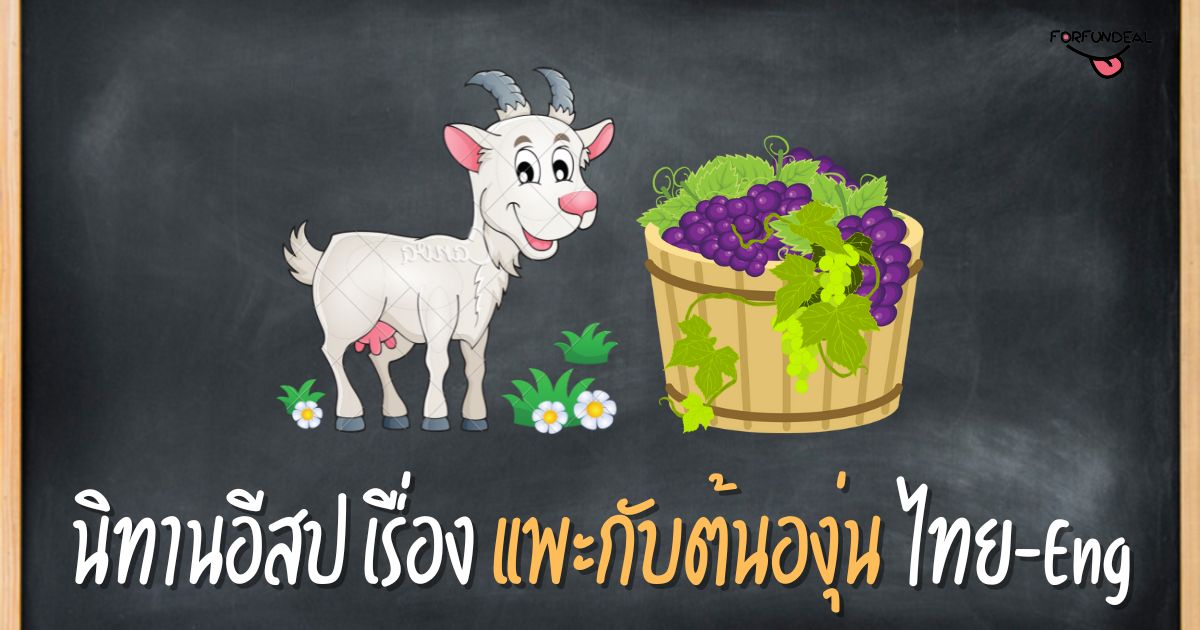“แพะกับต้นองุ่น” เป็นนิทานอีสปที่สอนเราถึงทุกการกระทำย่อมมีผลตามกลับมาหาเราเสมอ และสอนเราให้รู้ถึงคุณค่าของทุกสิ่งที่ไม่ได้มีด้านเดียวเสมอไป
นิทานอีสปเรื่องแพะกับต้นองุ่น
กาลครั้งหนึ่งนานมาแล้ว ในช่วงเวลาแห่งการเก็บเกี่ยวอย่างอุดมสมบูรณ์ เถาองุ่นก็แผ่กิ่งก้านอย่างสง่างามด้วยใบเขียวชอุ่มและพวงองุ่น อากาศช่างหอมหวานพร้อมคำสัญญาว่าจะมีไวน์มา ใกล้ๆ กัน มีแพะขี้สงสัยตัวหนึ่งเดินผ่านมาและชอบกิ่งก้านและใบอ่อนของต้นองุ่น มันเริ่มที่จะแทะออกไป
Once upon a time, In a time of abundant harvest, a vine stretched gracefully with its lush leaves and clusters of grapes. The air was sweet with the promise of wine to come. Nearby, a curious goat wandered by and took a liking to the vine’s young tendrils and leaves. It began to nibble away.
ต้นองุ่นรู้สึกถึงความอยากอาหารของแพะจึงพูดขึ้นอย่างแผ่วเบา “เจ้าแพะที่รัก ทำไมเจ้าถึงทำร้ายข้าโดยไม่มีเหตุผล ใบไม้และกิ่งก้านของข้าเป็นความภาคภูมิใจของข้า มีหญ้าสดรอบๆ ไม่พอให้เจ้าเพลิดเพลินหรือ?”
The vine, feeling the goat’s appetite, gently spoke up. “Dear Goat, why do you harm me without reason? My leaves and tendrils are my pride. Isn’t there enough fresh grass around for you to enjoy?”
แพะหยุดชั่วคราวและมองดูต้นองุ่น ปากของมันยังคงมีใบไม้เต็มอยู่ “ข้าไม่ได้คิดจะทำร้ายอะไร ใบไม้ของเจ้าดูน่าดึงดูดมาก”
The goat paused and looked at the vine, its mouth still full. “I didn’t mean any harm. Your leaves just seemed so tempting.”
ต้นองุ่นถอนหายใจเบาๆ “ข้าเข้าใจความหิวของคุณ แต่จำไว้ว่า ข้าเองก็มีวัตถุประสงค์เช่นกัน”
The vine sighed softly, “I understand your hunger, but remember, I too have a purpose.”
แพะเอียงศีรษะด้วยความงุนงง “วัตถุประสงค์?”
The goat tilted its head, puzzled. “Purpose?”
“ใช่” ต้นองุ่นพูดต่อ “ใบไม้และองุ่นของฉันจะเป็นไวน์ต่อไป และถ้าเจ้ายังทำร้ายข้าต่อไป ข้าจะต้องได้รับความยุติธรรม”
“Yes,” continued the vine. “From my leaves and grapes, wine will be made. And if you continue to harm me, I shall have my turn for justice.”
ดวงตาของแพะเบิกกว้างอย่างสนใจ “ความยุติธรรม? อย่างไร?”
The goat’s eyes widened, intrigued. “Justice? How?”
ต้นองุ่นอธิบายว่า “ถึงแม้เจ้าจะโค่นข้าจนถึงราก ข้าก็จะยังเป็นไวน์องุ่นที่จะเทลงบนตัวเจ้าเมื่อเจ้าขึ้นแท่นบูชายัญ เช่นเดียวกับที่เจ้าทำร้ายข้า ข้าก็จะมีโอกาสที่จะเอาคืนแก่เจ้าได้เช่นกัน”
The vine explained, “Even if you cut me down to my very roots, I will still provide the wine that will be poured over you when you ascend to the altar. Just as you harm me, I shall have my chance to repay you.”

นิทานเรื่องนี้สอนให้รู้ว่า
“การกระทำย่อมส่งผลตามมา และบางครั้งความเสียหายที่เราก่อต่อผู้อื่นก็อาจย้อนกลับมากระทบต่อเราในทางที่ไม่คาดคิด”
- ผลที่ตามมาจากการกระทำ: เรื่องราวเน้นย้ำว่าการกระทำมีผลที่ตามมา การแทะของแพะทำให้เกิดอันตราย และการตอบสนองของเถาวัลย์เน้นแนวคิดเรื่องการเก็บเกี่ยวสิ่งที่หว่าน
- ความสมดุลในธรรมชาติ: การตอบสนองของต้นองุ่นเน้นความสมดุลในธรรมชาติ สิ่งมีชีวิตทุกสิ่งมีบทบาทในตัวเอง และธรรมชาติก็มีวิธีการในการฟื้นฟูความสามัคคี
- การเอาใจใส่และความเข้าใจ: การร้องขอความเข้าใจของเถาวัลย์ส่งเสริมการเอาใจใส่ การพิจารณามุมมองและวัตถุประสงค์ของผู้อื่นเป็นสิ่งสำคัญ
- ความยุติธรรมและการตอบแทนซึ่งกันและกัน: แนวคิด “แค่แก้แค้น” ในเรื่องนี้สะท้อนถึงแนวคิดที่ว่าการกระทำอาจเกิดขึ้นวัฏจักรแบบวงกลม การปฏิบัติต่อผู้อื่นด้วยความเมตตาและความเคารพสามารถสร้างผลลัพธ์เชิงบวกได้
- การค้นหาจุดร่วม: เรื่องราวกระตุ้นให้เราค้นหาจุดร่วมและความเคารพระหว่างสายพันธุ์ต่างๆ ความเข้าใจซึ่งกันและกันสามารถนำไปสู่ความสามัคคี
- คุณค่าของวัตถุประสงค์: จุดประสงค์ของต้นองุ่น นอกเหนือจากใบและองุ่นแล้ว ยังทำหน้าที่เป็นเครื่องเตือนใจว่าทุกคนมีบทบาทและส่วนสนับสนุนที่เป็นเอกลักษณ์
“Actions have consequences, and sometimes the harm we cause to others may come back to affect us in unexpected ways.”
- Consequences of Actions: The story highlights that actions have consequences. The goat’s nibbling caused harm, and the vine’s response emphasizes the concept of reaping what is sown.
- Balance in Nature: The vine’s response underlines the balance in nature. Every being has a role to play, and nature has its way of restoring harmony.
- Empathy and Understanding: The vine’s request for understanding encourages empathy. It’s important to consider the perspective and purpose of others.
- Justice and Reciprocity: The concept of “just revenge” in the story reflects the idea that actions may come full circle. Treating others with kindness and respect can create positive outcomes.
- Finding Common Ground: The story prompts us to find common ground and respect among different species. Mutual understanding can lead to harmony.
- Value of Purpose: The vine’s purpose, beyond just leaves and grapes, serves as a reminder that every being has its unique role and contribution.
โดยสรุปแล้วนิทานเรื่องนี้แสดงให้เห็นถึงความสมดุลที่ละเอียดอ่อนของธรรมชาติและความเชื่อมโยงระหว่างสิ่งมีชีวิตทั้งหมด กระตุ้นให้เราคำนึงถึงผลที่ตามมาจากการกระทำของเรา แสดงความเห็นอกเห็นใจ และค้นหาความสามัคคีในการมีปฏิสัมพันธ์กับทั้งสิ่งแวดล้อมและผู้อื่น

